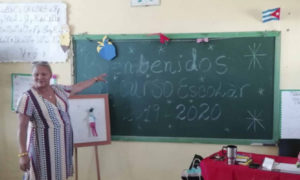* By Jaime Suchlicki

Faithful to Lenin’s ideas that the school should “educate and prepare members of the Communist society,” the Castro revolution used education as the instrument to build the new society – to develop the socialist man. Speaking of the educational aims of the revolutionary regime, party Organization Secretary Armando Hart explained that the objective of socialist education was “the ideological, scientific and technical formation of whole generations capable of actively constructing socialism and communism.” “The task of teaching and the ideological struggle are intimately related,” he emphasized. “It is necessary to educate man against the individualistic ideology and to instill in him the work methods derived from the Marxist-Leninist concept.”
The creation of the new man required a change in the values and attitudes of most Cubans. Allegiance had to be transferred from the family to the party and to the fatherland. The faltering influence of the Church had to be eliminated completely. The aversion of the Cubans to manual labor, together with the tradition that women’s place was in the home, had to be eradicated. The belief that events were determined by nature had to be transformed. And finally, the orientation toward the present had to be modified.
The new man and the new society envisioned by Castro and his regime would have to be significantly different. Devotion to the cause of communism and love of the fatherland would prevail. Man consciously would labor for the welfare of society. Each would work for all and all for each. The collective interest would supersede the individual one. Racial prejudices would be eliminated. Honesty and truthfulness would guide everyone’s life. The young would be taught to respect and admire party leaders, especially Fidel, and to obey party discipline. High consciousness of social duty and intolerance of violation of social interest would predominate.
The new socialist morality would retain those characteristics developed by Castro’s Rebel Army while fighting in the mountains against Batista. They included abnegation, a spirit of sacrifice, courage, and discipline. Speaking to a graduating class of teachers and after emphasizing that communism was not only a question of developing material wealth, but also of developing human awareness, Fidel described the type of man his regime proposed to create: “We will bring up human beings devoid of selfishness, devoid of defects of the past, human beings with a collective sense of effort, a collective sense of strength.”
The new society would be abundant in material wealth. But man would be less concerned with obtaining material goods for himself. He would rather work to produce for the whole society. “From an early age,” explained Fidel, “children must be discouraged from every egotistical feeling in the enjoyment of material things such as the sense of individual property and be encouraged toward the greatest common effort and the spirit of cooperation.” Not only is society to be abundant in material wealth, but money would be done away with. In a speech to the association of small farmers Castro explained his dream: “….there will arrive the day when money will have no value. Money is a vile intermediary between man and the products man creates.”
Not only money but other material incentives would be eliminated. Recalling Che Guevara’s preaching emphasizing the superiority of moral over material incentives, an editorial in Granma, the official newspaper of Cuba’s Communist Party, lashed at “economism,” which it described as “the tendency to consider that men produced more and better as they received more and better.” The new Communist ideology, explained the editorial, will not be imposed through talks, guidance, or meetings only but through a gigantic effort to organize the productive, social, educational, and cultural activity of the Cuban people.
In foreign affairs the Cuban masses would have to be irreconcilably opposed to the enemies of the fatherland, especially to the United States. The Cubans would show solidarity with the peoples of developing countries, of the socialist camp, and particularly, of Latin America as well as friendship and brotherhood toward the peoples of the Soviet Union. An American reporter visiting Cuba was shocked at the campaign of hate against the United States. “The saddest thing about the Cuban revolution,” wrote James Reston, “is that it is teaching hate and violence to the young. A remarkable new generation of Cubans, more literate and disciplined than any other, is being indoctrinated systematically with the idea that the United States is the embodiment of everything that is narrow, selfish, and evil in the world today.”
All of these dreams collapsed in the reality of a difficult world. After 60 years, the Revolution has developed into a nightmare of misery, repression and migration. A third of the Cubans have left the island. Those that stayed suffered years of oppression and poverty. Cuba is today a crumbling country with little hope for the future. The new man steals from state enterprises, works little, suffers quietly and waits for an opportunity to escape to the U.S. The Communist Party and the military still run the country with an iron fist and cling to power in the hope of self-preservation. They all know that the revolution has failed, and all the old dreams have evolved into a sad and scary reality.
*Jaime Suchlicki is Professor Emeritus, University of Miami and Director, Cuban Studies Institute, and author of six books on Cuba, Mexico and Latin America.









1 thought on “SOCIALISM AND EDUCATION IN CUBA”
“Well said my dear friend… a day after seeing the leading Democrat candidate on 60 Minutes ignorantly but still fervently praising the Cuban Regime’s social achievements!”
My brother Roberto Rodriquez sends his support too!
Comments are closed.